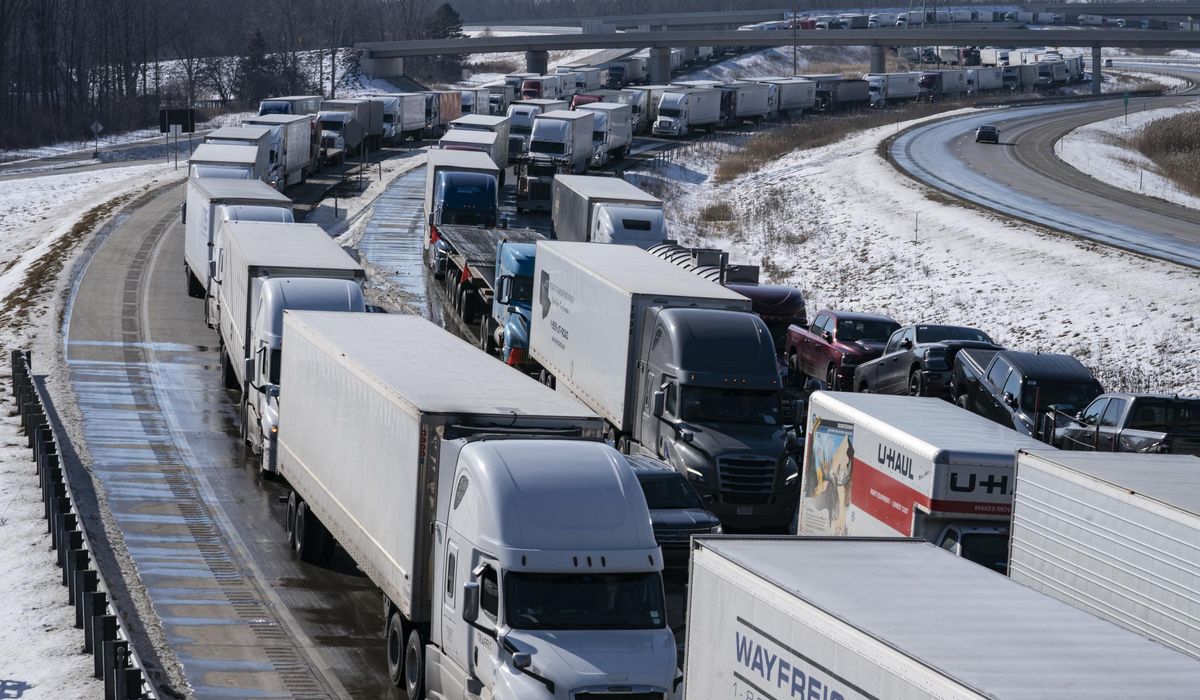

TORONTO — The Biden administration urged Prime Minister Justin Trudeau’s government Thursday to use its federal powers to end the truck blockade by Canadians protesting the country’s COVID-19 restrictions, as the bumper-to-bumper demonstration forced auto plants on both sides of the border to shut down or scale back production.
For the fourth straight day, scores of truckers taking part in what they dubbed the Freedom Convoy blocked the Ambassador Bridge connecting Windsor, Ontario, to Detroit, disrupting the flow of auto parts and other products between the two countries.
The White House said Homeland Security Secretary Alejandro Mayorkas and Transportation Secretary Pete Buttigieg spoke with their Canadian counterparts and urged them to help resolve the standoff.
With political and economic pressure mounting, Windsor Mayor Drew Dilkens announced the city will seek a court injunction to end the occupation.
“The economic harm is not sustainable and it must come to an end,” he said.
Meanwhile, the U.S. braced for the possibility of similar truck-borne protests inspired by the Canadians, and authorities in Paris and Belgium banned road blockades to head off disruptions there, too.
The U.S. Department of Homeland Security said in a bulletin to local and state law enforcement agencies that it has received reports that truckers are planning to “potentially block roads in major metropolitan cities” in a protest against vaccine mandates and other issues.
The agency said the convoy could begin in Southern California as early as this weekend, possibly disrupting traffic around the Super Bowl, and reach Washington in March in time for the State of the Union, according to a copy of Tuesday’s bulletin obtained by The Associated Press.
The White House said the department is “surging additional staff” to the Super Bowl just in case.
The ban on road blockades in Europe and the threat of prison and heavy fines were likewise prompted by online chatter from groups calling on drivers to converge on Paris and Brussels over the next few days.
The Ambassador Bridge is the busiest U.S.-Canadian border crossing, carrying 25% of all trade between the two countries, and the effects of the blockade there were felt rapidly.
Ford said its Windsor engine plant reopened Thursday after being shut down on Wednesday because of a lack of parts. But the factory and the company’s assembly plant in Oakville, Ontario, near Toronto, were operating at reduced capacity, the automaker said.
On the U.S. side, General Motors canceled the second shift on Wednesday and the first and second on Thursday at its SUV factory outside Lansing, Michigan.
Toyota said three of its plants in Ontario closed for the rest of the week because of parts shortages, and production also had to be curtailed in Georgetown, Kentucky.
Workers on the morning shift at a Windsor minivan plant operated by Stellantis, formerly Fiat Chrysler, were sent home early.
Michigan Gov. Gretchen Whitmer urged Canadian authorities to quickly resolve the standoff, saying: “It’s hitting paychecks and production lines. That is unacceptable.”
Hundreds of demonstrators in trucks have also paralyzed the streets of downtown Ottawa for almost two weeks now, and have now closed three border crossings: at Windsor; at Coutts, Alberta, opposite Montana; and at Emerson, Manitoba, across from North Dakota.
The protesters are decrying vaccine mandates for truckers and other COVID-19 restrictions and are railing against Trudeau, even though many of Canada’s precautions, such as mask rules and vaccine passports for getting into restaurants, theaters and other places, were enacted by provincial authorities, not the federal government, and are already rapidly being lifted as the omicron surge levels off.
Trudeau continued to stand firm against lifting vaccine mandates, including a requirement that all truck drivers entering the country be fully vaccinated. But because an estimated 90% of the nation’s truckers are already inoculated, some conservatives have called on the prime minister to drop the mandate.
The convoy has been promoted and cheered on by many Fox News personalities and attracted support from the likes of former President Donald Trump and Texas Sen. Ted Cruz.
The Associated Press identified more than a dozen Facebook groups encompassing roughly a half-million members that are being used to drum up support for the Canadian protests or plan similar ones in the U.S. and Europe.
To get around the blockade and into Canada, truckers in the Detroit area have had to drive 70 miles north to Port Huron, Michigan, and cross the Blue Water Bridge, where there was a two-hour delay leaving the U.S.
The blockade is happening at a bad time for the U.S. auto industry. Supplies of new vehicles already are low across the nation because of the global shortage of computer chips, which has forced automakers to temporarily close factories.
“This is the last thing any automaker needs, any manufacturer needs, because parts are so scarce,” industry analyst David Whiston said.
• Krisher and Mike Householder contributed from Detroit. AP writers Aamer Madhani, Ben Fox, Amanda Seitz contributed from Washington.
